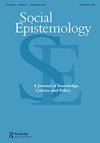机器人:一些较少考虑的认知问题
IF 2
2区 哲学
Q1 HISTORY & PHILOSOPHY OF SCIENCE
引用次数: 0
摘要
推特等社交媒体平台上的帖子有时是欺骗性设计的机器人的产物。这些机器人可能会导致明显的认知问题,比如欺骗人类用户相信误导性帖子的内容。然而,较少考虑的认知问题涉及错误的机器人判断,即人类用户将另一个人类用户的帖子误认为是机器人帖子,或者人类用户错误地认为机器人是在社交媒体上标记某些内容的主要工具。本文讨论了关于错误的机器人判断的三个问题:与错误判断相关的认知危害究竟是什么,它们有多有害,以及我们应该如何应对它们?本文章由计算机程序翻译,如有差异,请以英文原文为准。
Bots: Some Less-Considered Epistemic Problems
ABSTRACT Posts on social media platforms like Twitter are sometimes the products of deceptively designed bots. These bots can cause obvious epistemic problems, such as tricking human users into believing the contents of misleading posts. However, less-considered epistemic problems involve false bot judgements where a human user mistakes another human user’s post for a bot-post, or where a human user mistakenly believes that bots are the primary vehicles for tokening certain content on social media. This paper takes up three questions concerning false bot judgements: what exactly are their associated epistemic harms, just how harmful are they, and what should we do about them?
求助全文
通过发布文献求助,成功后即可免费获取论文全文。
去求助
来源期刊

Social Epistemology
Multiple-
CiteScore
2.60
自引率
17.60%
发文量
60
期刊介绍:
Social Epistemology provides a forum for philosophical and social scientific enquiry that incorporates the work of scholars from a variety of disciplines who share a concern with the production, assessment and validation of knowledge. The journal covers both empirical research into the origination and transmission of knowledge and normative considerations which arise as such research is implemented, serving as a guide for directing contemporary knowledge enterprises. Social Epistemology publishes "exchanges" which are the collective product of several contributors and take the form of critical syntheses, open peer commentaries interviews, applications, provocations, reviews and responses
 求助内容:
求助内容: 应助结果提醒方式:
应助结果提醒方式:


